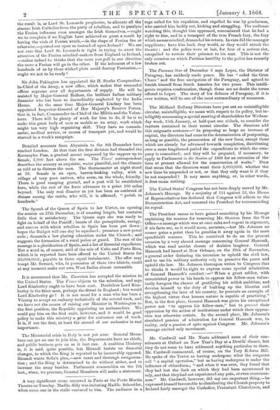The President seems to have gained something by his Message
explaining his reasons for removing Mr. Stanton from the War Office—a message which was at once calm and cogent in argument,. if his facts are, as it would seem, accurate,—but Mr. Johnson no sooner gains a point than he gambles it away again in the most spendthrift manner. This he contrived to do on the present occasion by a very absurd message concerning General Hancock, which was read amidst shouts of derisive laughter. General Hancock had issued at New Orleans, on the 29th of November,. a general order declaring his intention to uphold the civil law, and to use his military authority only to preserve the peace and uphold the law. Mr. Johnson thereupon writes to Congress that he thinks it would be right to express some special admiration of General Hancock's conduct :—" When a great soldier, with unrestricted power in his hands to oppress his fellow-men volun- tarily foregoes the chance of gratifying his selfish ambition, and devotes himself to the duty of building up the liberties and strengthening the laws of his country, he presents an example of the highest virtue that human nature is capable of practising." But, in the first place, General Hancock was given his exceptional power not "to oppress his fellow-men," but to prevent their oppression by the action of institutions under which their oppres- sion was otherwise certain. In the second place, Mr. Johnson's simulated passion of admiration for General Hancock was, in reality, only a passion of spite against Congress. Mr. Johnson's. message excited only merriment.








































 Previous page
Previous page